- Home
- Beverley Harper
Jackal's Dance
Jackal's Dance Read online
Beverley Harper died of cancer on 9 August 2002. She rests at peace in the Africa she so loved.
Her ashes lie by the Boteti River in Botswana, below a lodge called Leroo-la-Tau. It means Footprints of Lion.
It is a special place.
This simple plaque marks her passing:
Also by Beverley Harper
Storms Over Africa
Edge of the Rain
Echo of an Angry God
People of Heaven
The Forgotten Sea
Jackal’s Dance
Shadows in the Grass
Footprints of Lion
JACKAL’S DANCE
BEVERLEY HARPER
CONTENTS
COVER
ABOUT BEVERLEY HARPER
ALSO BY BEVERLEY HARPER
TITLE PAGE
COPYRIGHT
DEDICATION
ACKNOWLEDGEMENTS
MAP
PROLOGUE
ONE: THE STUDENTS
TWO: THE RANGERS
THREE: THE TOURISTS
FOUR
FIVE
SIX
SEVEN
EIGHT
NINE
TEN
ELEVEN
TWELVE
THIRTEEN
FOURTEEN: AFTERMATH
AUTHOR’S NOTE
First published 2001 in Macmillan by Pan Macmillan Australia Pty Limited
This Pan edition published 2002 by Pan Macmillan Australia Pty Limited
1 Market Street, Sydney
Reprinted 2002, 2003, 2004 (twice), 2005, 2007, 2008
Copyright © Beverley Harper 2001
The moral right of the author has been asserted.
All rights reserved. No part of this book may be reproduced or transmitted by any person or entity (including Google, Amazon or similar organisations), in any form or by any means, electronic or mechanical, including photocopying, recording, scanning or by any information storage and retrieval system, without prior permission in writing from the publisher.
National Library of Australia
cataloguing-in-publication data:
Harper, Beverley.
Jackal’s dance.
ISBN 978-0-330-36359-4
1. Etosha Game Park (Namibia). 2. South Africa – Fiction.
3. Adventure Stories. I. Title.
A823.3
Map by Mike Gorman
Typeset in Bembo by Post Pre-press Group
Printed in Australia by McPherson’s Printing Group
This novel is a work of fiction. Names and characters are the product of the author’s imagination or are used fictitiously and any resemblance to actual persons, living or dead, is entirely coincidental.
Papers used by Pan Macmillan Australia Pty Ltd are natural, recyclable products made from wood grown in sustainable forests. The manufacturing processes conform to the environmental regulations of the country of origin.
These electronic editions published in 2002 by Pan Macmillan Australia Pty Ltd
1 Market Street, Sydney 2000
The moral right of the author has been asserted.
All rights reserved. This publication (or any part of it) may not be reproduced or transmitted, copied, stored, distributed or otherwise made available by any person or entity (including Google, Amazon or similar organisations), in any form (electronic, digital, optical, mechanical) or by any means (photocopying, recording, scanning or otherwise) without prior written permission from the publisher.
Jackal’s Dance
Beverley Harper
Adobe eReader format: 978-1-74262-701-4
EPUB format: 978-1-74262-703-8
Online format: 978-1-74262-700-7
Macmillan Digital Australia
www.macmillandigital.com.au
Visit www.panmacmillan.com.au to read more about all our books and to buy both print and ebooks online. You will also find features, author interviews and news of any author events.
For Robert, Piers, Miles and Adam
as usual and always.
But particularly Piers
for his African game-ranger expertise.
And Robert
for editing.
And Miles for looking
after the animals while I’m having African walkies.
And Adam
for reading my books to his girlfriend.
Love you all to pieces.
I wish to thank Paul van der Bijl of Gamsberg Macmillan Publishers in Windhoek for taking pity on a stranded author and offering great accommodation. He probably should have known better than to place a writer in a castle’s wine cellar, but a most enjoyable night was the result. Ever the diplomat, Paul didn’t bat an eyelid when I succumbed to the fresh air (I insist it was the air!) and fell asleep at the table. My husband and eldest son told me my ostrich kebabs were delicious.
Thanks must also go to two intrepid veterinarians – Bluey Carmichael of South Australia who dredged up memories of his time in Botswana and shared them with me, and Larry Patterson who still lives in Africa. Thanks to the wonders of technology, Larry was able to answer my questions by e-mail before dashing back into the bush to dart buffalo.
PROLOGUE
Extreme, intense, white-hot heat.
It had a sound like nothing else. A crackling, buzzing persistence, almost deafening in the depths of silence, drumming ears with its song of fire. It felt like no other. Lying on the skin, a prickly, hairy blanket, stifling pores that sucked greedily for air. They found none. It had burned dry. Nothing smelled like heat. Hot earth, crisped leaves and a furnace breeze that carried the ache of an arid emptiness. The taste of it clung in the mouth, a desiccated tackiness, like withered death sprinkled with salt. Even saliva could not cut it.
Twelve men lay, each in his own torpid stupor. They’d found shade but it gave no respite from the tight headache, stinging eyes or cramping pangs of dehydration. There was no need for movement. Nor was there any will to try. The day would pass, night would fall. Evening would bring relief, of sorts. Until then there was nothing to do but suffer.
One cast a lethargic eye skyward. ‘Rain.’
Others glanced up. Black cumulus clouds massed to the south-west.
‘Maybe, later.’
It was the extent of their conversation.
The elephant herd pressed north, browsing as they went. One of their number, a cow with no tusks, jostled incessantly to steal succulent tubers or shredded bark and was irritably repulsed. Normally good-natured and tolerant of her attempts to steal food, the extreme temperature had tempers frayed. Her demands were resented. Finally, the matriarch intervened and chased her away.
The tuskless cow ambled along behind the herd. Hunger rumbled in her belly like distant thunder in the approaching storm. She’d eaten leaves and fruit all day. Now she wanted the tubers being dug up by the others. Flapping her ears in annoyance, she head-butted the wrinkled rump in front of her. The half-grown bull reacted immediately, turning and thrusting at the cow with his tusks. She lunged out of their way but stood in defiance, challenging him to take the matter further. He backed down. A semi-outcast she might have been but still she ranked higher than him in the herd’s hierarchy. And she was known for her volatility.
They were close to the river and could smell water. Thirsty as they all were, the elephants stopped in a thicket of mopane and began breaking branches, feeding the leaves greedily into their mouths. The cow joined them. They knew from experience that the water would be cooler and more refreshing at the end of the day.
The sound of snapping branches carried clearly to the men, although they were a good kilometre from the herd. One turned lazy eyes in the direction from which it had come, forcing his ears to listen, his mind to focus
. Others did the same. They were trespassers, strangers in a land that was not theirs, and detection was the last thing they needed. The noise went on too long for it to have been made by anything other than feeding elephants. All twelve relaxed.
At that moment the breeze picked up, swirling in confusion as the storm chased behind it, driving it towards them. The men became alert, savouring the sweetness of promised rain. Round in circles swept the strengthening wind, tossed first one way and then the other. Within fifteen minutes, the temperature plummeted by as many degrees. ‘Think we’ll get it?’ one man asked.
Another shrugged. ‘Looks like it’s going around us.’
A couple of fat splashes made craters in the dust. Then nothing. The storm boiled its way eastwards. A couple of teasing drops was all it could spare. The men were pleased about that. They had no protection against a drenching downpour.
A kilometre away, the eddying wind brought with it an unwelcome scent. The herd picked it up as one. Their matriarch turned, plodding away from it with determination, not in fear so much as distrust and disapproval. She knew this smell. It was alien to creatures of the bush and therefore aroused suspicion. The rest of the elephants followed.
All but one.
The tuskless cow lifted her trunk. There was no mistake. Her heart surged with hate as instinct dictated reaction. She took a bearing, and set off through the sandy scrub country, sucked in by the scent of man. Secure in her bulk, myopic in her intent, nothing warned her to take care.
With the day’s heat suddenly dissipating, the revitalised men began to talk between themselves.
‘We should move closer tonight.’
‘Why? Here it is safe.’
‘We will not be that until we cross back over the border.’
One who sat apart from the others raised his head and spoke. ‘We stay here until I say it is time to move.’ His eyes challenged the others to disagree.
The authority was his. No-one argued.
The cow kept losing her airborne incentive but continued on regardless. Every now and then the swirling breeze would bring it back to her. She stepped from a clearing and stopped, trunk raised, uncertain which way to go. Her eyesight was not good enough to see the men a mere two hundred metres away but she heard their sudden excited voices. Without hesitation, she charged towards the sound.
The sudden appearance of an elephant galvanised the group into gabbling confusion. The man in charge snapped, ‘Be quiet, you fools.’ Snatching up his AK47 he sprang off the ground, flicked the selector to single shot and stepped sideways, further from the others. The animal came at them like a fast-moving, low and rolling storm cloud. Waiting calmly until she was no more than thirty metres from where the rest stood frozen with fear, he squeezed the trigger.
Hate. Hate. Hate. It was in her heart, an instinctive reaction to these two-legged creatures. Irrational and for no reason, but she was a wild thing who needed none. Kill. Kill. Kill.
Agony exploded in her knee. She staggered, tried to keep going, then nearly fell as a shocking pain rushed up her leg. Flee. Flee. Flee. Confusion and fear swamped her senses, escape suddenly essential. The tuskless cow turned and hobbled away, each step agonising torture. The limb was useless, unable to support her great weight. It buckled, the lower half swinging crazily, and the elephant, incapable of reasoning why, trumpeted a pain-filled protest and kept moving. The safety and security of the herd were now a desperate need in her.
Her front right knee joint had been shattered by the single copper-jacketed bullet. Even as she stumbled in search of the herd, flies found the wound.
Man, her hated enemy, had just handed out a death sentence.
ONE
THE STUDENTS
Pre-dawn in the African bush is a time of transition. In Etosha National Park, far up in the north of Namibia, it is a time when the hunters straggle home to sleep, the hunted relax their tense all-night vigil and scavengers gorge on the remains of the unfortunate. Vultures descend by the dozen at first light. It is the coolest hour of the day, the temperature hovering just below twenty degrees Celsius. The fickle breeze seems to hold its breath in awe of the wild dawn chorus. Zebra bark in hysterical alarm, kwa-ha, kwa-ha – something between a horse’s whinny and the braying of a donkey. Wildebeest grunt agreement with each other. A small number of zebra mingle with a larger wildebeest herd for protection against predators, their combined concern filling the air, almost obliterating all other sounds.
Only a few penetrated the cacophony of noise. This particular morning, the story of life and death was clearly audible to those who knew the language. Some distance away a small pack of spotted hyena giggled and squabbled over the remains of a young giraffe from which they had successfully driven a full-grown leopard. Relying on strength in numbers to fill their bellies, not many predatory animals would choose to defend a kill against the hyena’s teeth and jaws which were capable of shredding and splintering the toughest bone and hide – alive or dead – in seconds. The chilling, sniggering chuckle from twelve feeding animals carried easily in the still air and could be heard up to four kilometres away.
The cause of the zebra and wildebeest’s alarm, a solitary black-maned lion, strolled leisurely and unconcerned past the herd. He’d eaten well during the night. Now he called into the darkness, seeking out the rest of the pride, loud throaty grunting yawning – a self-satisfied sound of content – and a kudu responded with a hoarse bark of wariness, bogh, a dead giveaway as to the presence of predators. The velvet-black depth of dwindling night seemed poised between death and expectation.
Dawn broke like a whip cracking, sharp and crisp. One moment it was difficult to separate the shadow from real as they merged together, blurring into a formless, inky amorphia. The next, as shapes caught the first faint pledge of light, details leapt out in sharp contrast. There was very little messing around, no time for niceties in this harsh thorn-scrub land stubbled with sun-dried grasses which somehow clung to life in the shimmering mica-reflecting sand. A moment of softness, that was all, when the slight dampness of night rose from dust-laden leaves and briefly perfumed the early morning air with its distinctive scent of moisture. A tantalising, seductive promise that nature would not keep. Even before the sun rose, bringing with it the suffocating, throat-burning heat of another parched day, the barely-there mantle would have evaporated, blasted away into nothing more than a memory.
Gary Fletcher – ‘Fletch’ to all and sundry – hunkered down next to the blackened kettle that hissed to boiling over the rekindled coals of last night’s fire. Rubbing sleep from his eyes, he switched off the torch to savour the momentary gentleness of a rapidly lightening day. Seven enamel mugs, three with tea bags, the rest with coffee, stood on a rickety table nearby. As drops of boiling water spluttered from the kettle, Fletch rose and bent over the fire. Using the end of his T-shirt as protection, he picked up the steaming vessel and dumped it roughly onto the table. The thin material didn’t quite do it, he knew it wouldn’t, but the pot holder had fallen victim to that mysterious camp occurrence dubbed by everyone as AWE syndrome, or absent without explanation, and despite an intensive search of the camp and surrounding bush, the elusive device had never been seen again. Speculation over its fate ranged from the ‘all things are collected by something’ theory to that of serving as a snack for a passing hyena. Whatever, its disappearance caused some inconvenience and remained a mystery. Fletch’s hand smarted from the heat and steam as he hastily dropped the kettle, causing the lid to fly off. The noise startled something nearby. He heard a rustle and caught the shadowy flash of a fleeing yellow mongoose as it bounded away.
Angela would bitch about the black stains on the dishcloth but that was her problem. Fletch picked it up and used it as protection while he replaced the lid. Sooty black marks immediately appeared on the cloth. Fletch shrugged. Better than a burnt hand. He wrapped it around the kettle’s handle. The professor first. Boiling water splashed into a mug. Three teaspoons of sugar followed. He stirred it th
oroughly and then quickly, before the enamel heated too much, made his way to the professor’s tent.
Eben Kruger, Professor of Zoology at the University of the Witwatersrand in Johannesburg, or, as it was more commonly called, Wits, liked his coffee black, strong, sweet and on time. Four forty-five, to be precise. Many of his students were subjected to a stinging tongue-lashing for being late. Fletch had been in the field with the professor once before. An outstanding academic, Eben Kruger had the petulance of a child when it came to personal inconvenience. Fletch knew better than the others that late or early delivery of coffee meant a day of withering criticism and allocation of the worst possible jobs from the old boy.
‘Prof,’ he called softly, standing outside the tent. Eben Kruger liked them to call him that.
‘Unnnnnhff.’
‘Coffee.’
Eben groaned, cleared his throat and replied, ‘Kom.’
Fletch pushed the tent flap aside and entered. The professor disdained the idea of zipping his canvas sleeping quarters shut, although he demanded that all his students secure themselves into theirs at night. As usual, the interior stank of stale socks and alcohol. ‘Good morning.’
In the gloomy half-light, Eben emerged like a wild thing from his sheet, blinking sleepily. He always reminded Fletch of someone who had stuck their finger into an electric socket. Long hair frizzed out in a thin grey mess, white stubble of beard which grew in erratic patches, matted curls covered his bony, almost concave chest.
Last year, Fletch had seen the professor completely naked as he emerged, quite unconcerned by his nudity, from the ablution tent. Nature had played a joke on Eben. His pubic hair was sparse but his buttocks had a lush covering of grey curls. The sight left his student with an indelible image of a tall, scrawny, furry thing, a memory which clothes did nothing to conceal. Fletch placed the steaming mug carefully on a battered leather suitcase and left the tent. Early morning conversations were not the study leader’s thing – he tended to regard any attempt at communication with deep suspicion and a loathing second only to tardiness with his coffee. Besides, the vision of that unkempt face slack from recent sleep and devoid of badly fitting false teeth, the strangely blue, thin lips collapsed inwards, filled Fletch with an impression he knew was unfair. Eben Kruger had one of the sharpest minds he’d ever come across and it was hardly the older man’s fault that, in his sixties, the accompanying body was less than perfect.

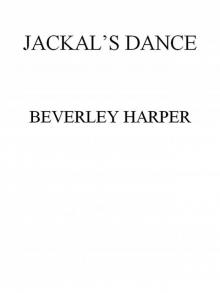 Jackal's Dance
Jackal's Dance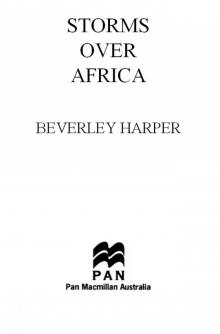 Storms Over Africa
Storms Over Africa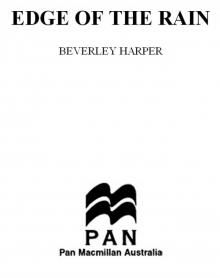 Edge of the Rain
Edge of the Rain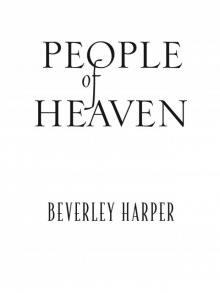 People of Heaven
People of Heaven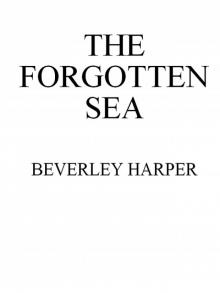 The Forgotten Sea
The Forgotten Sea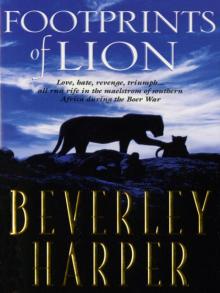 Footprints of Lion
Footprints of Lion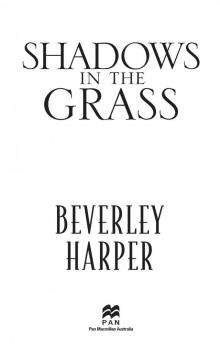 Shadows in the Grass
Shadows in the Grass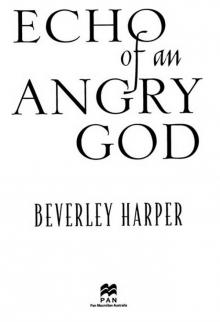 Echo of an Angry God
Echo of an Angry God